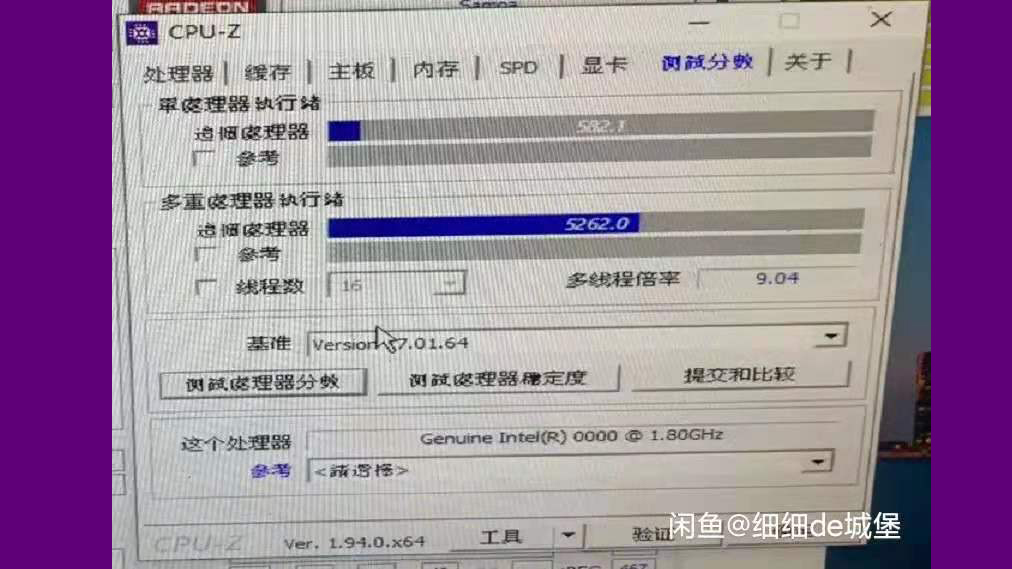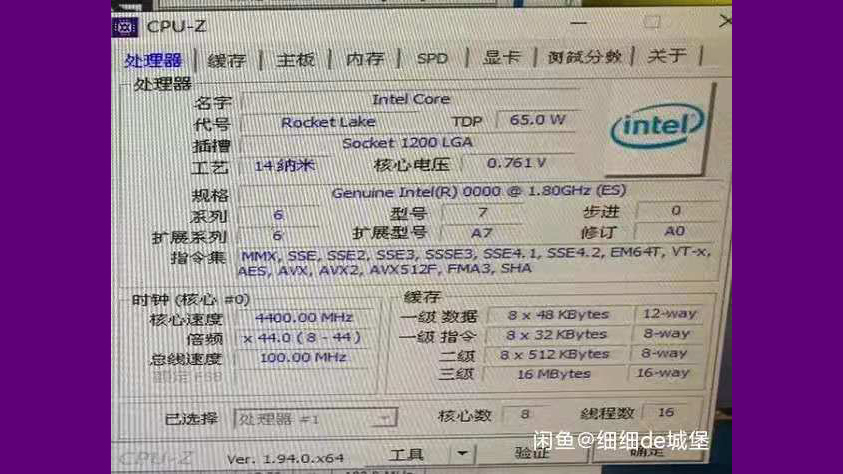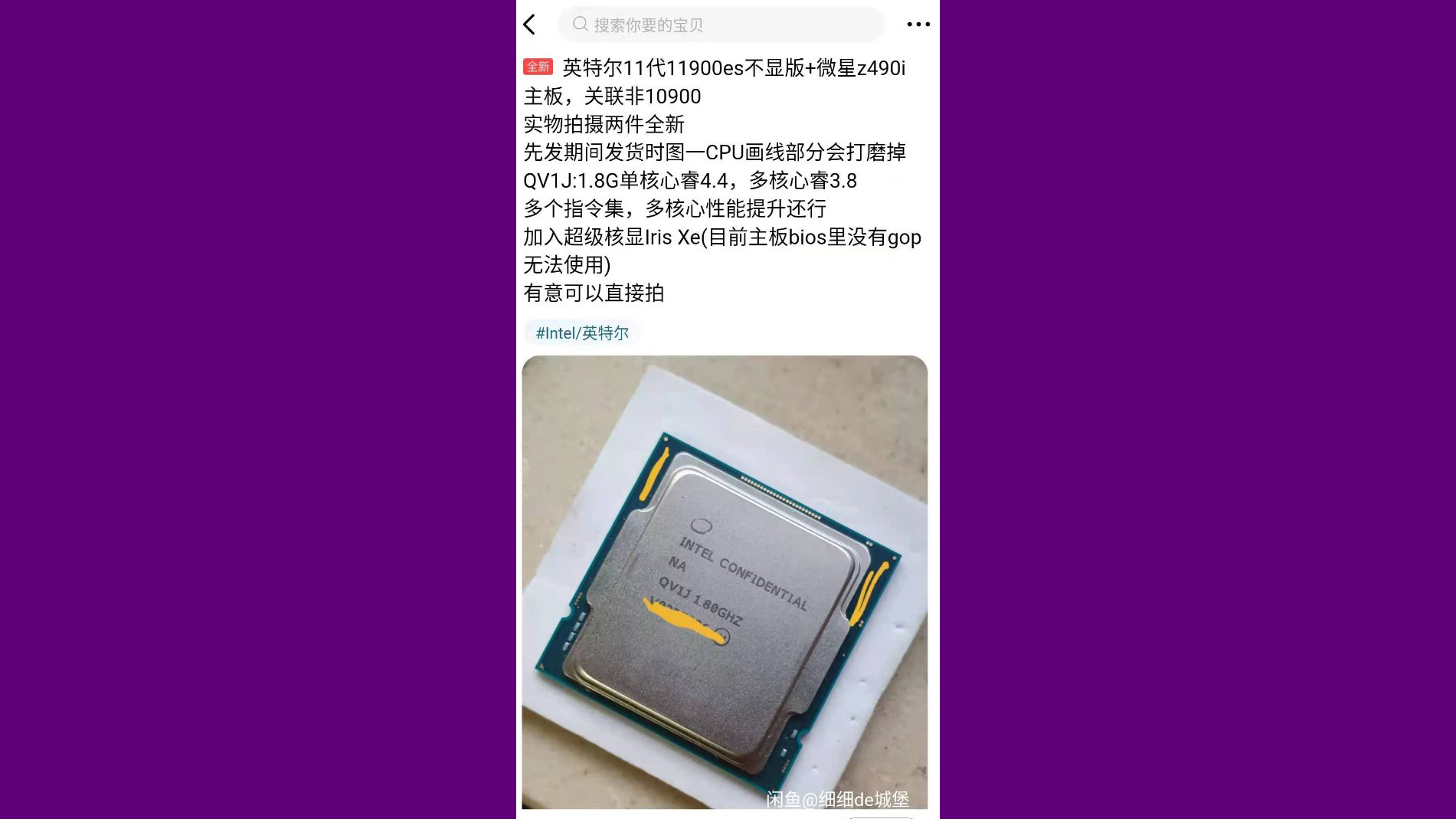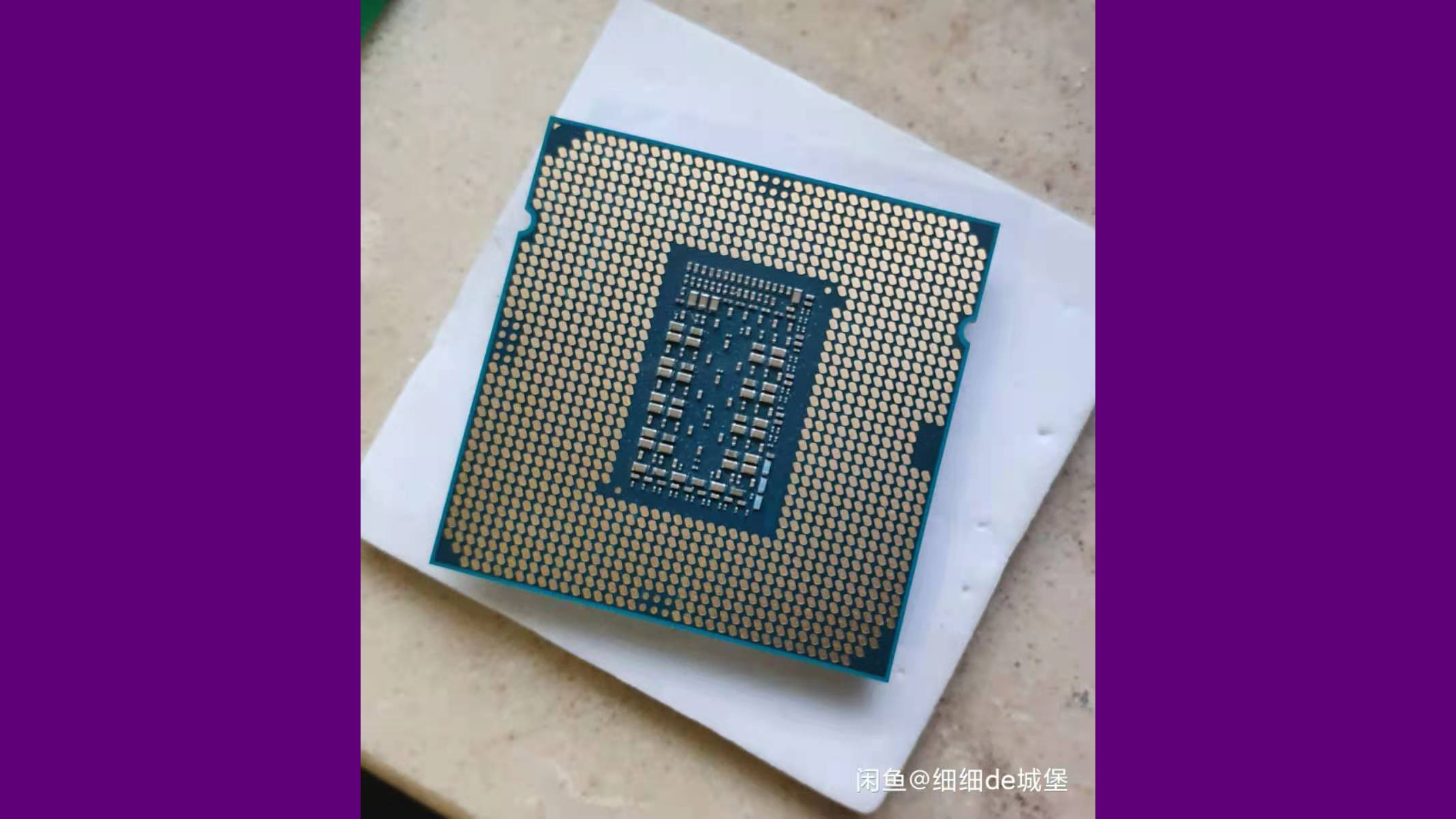Core i9-11900 Rocket Lake Flexes in CPU-Z Benchmark
Downgrading to 8 cores and 16 threads could lead to issues
Intel is getting closer to its Rocket Lake launch next year and is already pumping out engineering samples of its future Rocket Lake CPUs. As spotted by HXL, someone in China managed to snag an engineering sample of an eight-core 16-thread Core i9-11900 and put the processor through its paces in a CPU-Z test. The Rocket Lake chip scored 582 in the single-threaded test and 5262 in the multi-threaded benchmark.




The Core i7-10700K is the closest CPU in the CPUz benchmark database, scoring 568 in single-core and 5625 in multi-core benchmarks. That's around 7% faster than the Rocket Lake Core i9.
While the Rocket Lake chip's result is strange, bear in mind that the engineering sample runs at much lower frequencies than we'll probably see with final silicon. For now, the SKU runs with a 1.8 GHz base, 3.8 GHz all-core boost, and a 4.4 GHz single-core turbo. This is quite normal, though; engineering samples are not finalized products and are only used for development purposes. As such, we should expect the finalized product to have much higher core clocks.
For instance, as spotted by momomo_us, the rumored core frequencies for the Core i7-11700 are 2.5 GHz - 4.9 GHz, and the Core i5-11400 lands at 2.6 GHz - 4.4 GHz. Naturally, we expect the Core i9 models to have much higher boost frequencies.
However, while the slower frequencies explain the lackluster single-threaded performance, Rocket Lake's lower core counts are partially to blame for the reduced multi-core performance.
For Rocket Lake CPUs, Intel has downgraded core counts to 9th-Gen Coffee Lake levels – now the Core i9 models max out at eight cores and 16 threads. That means the only difference between the 10th Gen Core i7s, 11th Gen Core i7s, and Core i9s is clock speed alone (besides a few minor enhancements for the 11th gen chips).
The reduced core counts result from Intel's use of a 10nm architecture that's backported to a less-dense 14nm node. This is not ideal at all. In fact, new core architectures are traditionally not designed to be backported onto larger nodes, as the resulting chip has fewer transistors within any given area. That gives chip designers a smaller transistor budget to work with, which ultimately results in some additives, like cores and GPU EUs, being discarded.
Get Tom's Hardware's best news and in-depth reviews, straight to your inbox.
But, as with any product, the Rocket Lake chips are developed with certain design targets in mind - in the case of Rocket Lake, Intel is obviously focused on vastly improving its IPC, and thus gaming performance. Pairing Rocket's increased IPC with Intel's stellar 14nm clocks could result in blistering gaming performance, but the jury is still out until silicon hits our test benches. Hopefully, Intel can give the Core i9 chips enough frequency to keep them relevant against rivals like AMD – competition is good for everyone.

Aaron Klotz is a contributing writer for Tom’s Hardware, covering news related to computer hardware such as CPUs, and graphics cards.
-
howiejcee Sigh, core count is the only reason I wouldn't upgrade to Rocket Lake from a 9700k.Reply
I'd rather not spend ~$1,500 on a brand new mb, RAM, thermoelectric cooler (assuming someone will make one for it), and CPU itself for IPC gains primarily.
With 10 cores, maybe it'd be worth it. -
mdd1963 "Sigh, core count is the only reason I wouldn't upgrade to Rocket Lake from a 9700k. "Reply
It would or should be hard for most folks to find a 9700K, which matches /exceeds all Ryzen 3000 series CPUs in all gaming comparisons, to yet be considered even remotely 'in need of upgrade' just yet.... To jump from 150 fps in most games to 160 fps is rarely a 'must do now' scenario' -
samopa Why would I want to upgrade new processor + new Mobo to something that still uses 14++++++nm, limited to only 8 core, and have single core performance less than previous gen processor, and possibly less than Zen3 ?Reply
Who, with the right mind, will do such a thing ? And for what reason ? -
ingtar33 lower clock speeds on rocket lake are an absolute guarantee.Reply
if rocket lake's chip design was as great as intel has been trumpeting for the last 18 months they would have rushed it out the door. the reality is they're having difficulty clocking the design up, resulting in a net wash in performance with prior gen chip. -
TechyInAZ I doubt that Rocket Lake should clock higher than any generation period. But because they are backporting, that's causing loads of problems for Intel, hence why its taking so long to come out. 14nm can still clock stupidly high, it's the pure 10nm superfin stuff that can't really clock high at all.Reply -
InvalidError Reply
Plenty of people have no foreseeable need for more than eight cores so "being limited to eight cores" is of no consequence. I will most likely upgrade my i5-3470 next year and the choice between the i5-11400 and Ryzen 5600 will boil down to system performance-per-dollar with my personal experience of never having had issues with Intel builds vs no-boot with Ryzen twice being the tie-breaker.samopa said:Who, with the right mind, will do such a thing ? And for what reason ? -
jonRock1992 Well that's not good. My 5800X with PBO, Curve Optimizer, and tuned memory at 2067MHz FCLK gets 680+ single-thread score and 6800+ multi-thread score. If I do an all-core OC my multi-core score gets even higher.Reply -
badger2k Reply
It's a shame that fanboyism has caused your intelligence to be visually lacking. This engineering sample was on par with the 10900k(5.3ghz) at 17% lower clocks. The final product is going to have the fastest single threaded performance of any CPU in history by far. Also, it'll be supported on all existing 400 series motherboards.samopa said:Why would I want to upgrade new processor + new Mobo to something that still uses 14++++++nm, limited to only 8 core, and have single core performance less than previous gen processor, and possibly less than Zen3 ?
Who, with the right mind, will do such a thing ? And for what reason ? -
huxflux In the most conservative projection, at the final freqs this will score 700 in CPUID single core. Closer to 800 most likely. That's impressive.Reply